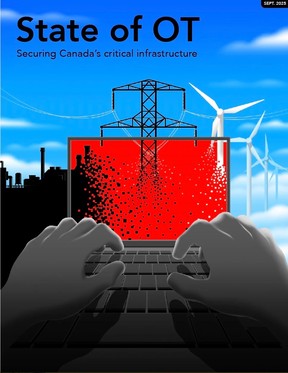
Article content
When Canadians think of cybersecurity, we picture stolen passwords, hacked emails or corporate data breaches. But a far greater threat lurks in the background, one that could disrupt transportation, poison water supplies or plunge entire regions into darkness.
THIS CONTENT IS RESERVED FOR SUBSCRIBERS ONLY
Subscribe now to read the latest news in your city and across Canada.
- Exclusive articles from Barbara Shecter, Joe O'Connor, Gabriel Friedman, and others.
- Daily content from Financial Times, the world's leading global business publication.
- Unlimited online access to read articles from Financial Post, National Post and 15 news sites across Canada with one account.
- National Post ePaper, an electronic replica of the print edition to view on any device, share and comment on.
- Daily puzzles, including the New York Times Crossword.
SUBSCRIBE TO UNLOCK MORE ARTICLES
Subscribe now to read the latest news in your city and across Canada.
- Exclusive articles from Barbara Shecter, Joe O'Connor, Gabriel Friedman and others.
- Daily content from Financial Times, the world's leading global business publication.
- Unlimited online access to read articles from Financial Post, National Post and 15 news sites across Canada with one account.
- National Post ePaper, an electronic replica of the print edition to view on any device, share and comment on.
- Daily puzzles, including the New York Times Crossword.
REGISTER / SIGN IN TO UNLOCK MORE ARTICLES
Create an account or sign in to continue with your reading experience.
- Access articles from across Canada with one account.
- Share your thoughts and join the conversation in the comments.
- Enjoy additional articles per month.
- Get email updates from your favourite authors.
THIS ARTICLE IS FREE TO READ REGISTER TO UNLOCK.
Create an account or sign in to continue with your reading experience.
- Access articles from across Canada with one account
- Share your thoughts and join the conversation in the comments
- Enjoy additional articles per month
- Get email updates from your favourite authors
Sign In or Create an Account
or
Article content
This is the realm of operational technology (OT) cybersecurity.
Article content
Article content
According to a new national report from the Canadian Cybersecurity Network (CCN) titled State of OT: Securing Canada’s Critical Infrastructure, it is the country’s most urgent and overlooked digital battleground.
Article content
Article content
The hidden systems that keep Canada running
Article content
By signing up you consent to receive the above newsletter from Postmedia Network Inc.
Article content
OT systems don’t just move data; they move the country. They control the electricity that powers our homes, the pipelines that fuel our economy, the mining equipment that extracts our resources and the ports that move goods. They even support the hospital systems that sustain life.
Article content
As information technology (IT) and OT converge, the risks multiply. A single phishing email can cascade into an industrial shutdown. A ransomware attack on a hospital can delay surgeries or divert ambulances. In 2024 alone, 73 per cent of reported cyber incidents in Canada affected OT systems, up from 49 per cent the year before.
Article content
Public safety and human lives increasingly depend on the integrity of OT systems.
Article content
Two recent incidents underscore the stakes: the U.S. Colonial Pipeline hack, which disrupted fuel supplies across the country and the Black Basta ransomware attack on Ascension Health, which hindered care for millions.
Article content
These are stark reminders of the consequences when OT is left exposed.
Article content

Article content
Canada is falling behind global peers
Article content
While countries like the U.S., U.K., and Germany have prioritized OT with national strategies and funding, Canada has yet to follow suit. Many systems remain outdated and unpatched.
Article content
Article content
Small and mid-sized operators, such as local utilities, often lack the expertise and budget to defend themselves. And there is no national inventory of OT risks, making coordinated response nearly impossible.
Article content
Legislation may be on the horizon. The Critical Cyber Systems Protection Act (CCSPA), reintroduced in Parliament as part of Bill C-8, promises to impose mandatory cybersecurity obligations on federally regulated infrastructure, from energy and telecom to banking and transportation.
Article content
But the bill has yet to be enacted and, until it is, Canada remains without a national framework for securing OT systems.
Article content
As one section of the CCN report warns, ransomware and nation-state probing of critical infrastructure are “almost certain” to continue.
Article content
Without decisive action, Canada risks being left dangerously exposed.
Article content
A national vulnerability
Article content
The report makes clear that OT vulnerabilities stretch across every sector.
Article content
- Energy and utilities: Grid operators track 60 new vulnerabilities daily.
- Healthcare: Cyberattacks compromise everything from HVAC systems to surgical equipment.
- Mining and natural resources: Remote automation systems are increasingly targeted.
- Transportation and maritime: Rail networks, ports and aviation hubs rely on OT automation.
- Smart cities and water systems: Traffic management, sewage treatment and drinking water depend on OT.

.jpg) 1 hour ago
3
1 hour ago
3
 English (US)
English (US)